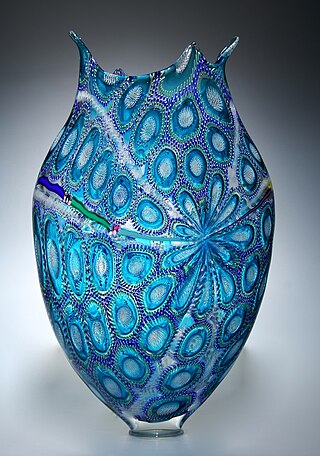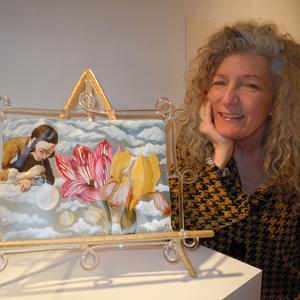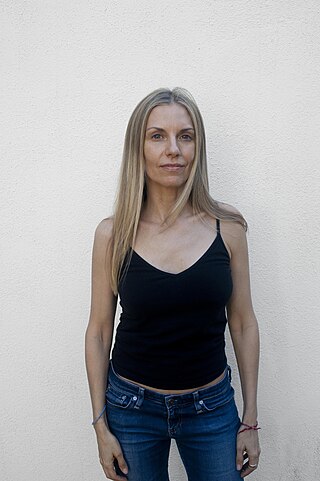
Studio glass is the modern use of glass as an artistic medium to produce sculptures or three-dimensional artworks in the fine arts. The glass objects created are intended to make a sculptural or decorative statement, and typically serve no useful function. Though usage varies, the term is properly restricted to glass made as art in small workshops, typically with the personal involvement of the artist who designed the piece. This is in contrast to art glass, made by craftsmen in factories, and glass art, covering the whole range of glass with artistic interest made throughout history. Both art glass and studio glass originate in the 19th century, and the terms compare with studio pottery and art pottery, but in glass the term "studio glass" is mostly used for work made in the period beginning in the 1960s with a major revival in interest in artistic glassmaking.

Ginny Ruffner is a pioneering American glass artist based in Seattle, Washington. She is known for her use of the lampworking technique and for her use of borosilicate glass in her painted glass sculptures.
Judy Jensen is an American artist who resides in Austin, Texas. She is best known for her reverse painting on glass, although she incorporates other mixed media into her glass pieces. According to Nancy Bless, Jensen's works "lie somewhere between a collage and a collection."
Judith Schaechter is a Philadelphia-based artist known for her work in the medium of stained glass. Her pieces often use symbolism from stained glass and Gothic traditions, but the distorted faces and figures in her work recall a 20th century German Expressionist painting style and her subject matter is secular. Shaechter's work often involves images that might be considered disturbing such as death, disease, or violence. Early Schaechter pieces, for example, such as King of Maggots and Vide Futentes make use of memento mori, symbols of death found in church architecture during medieval times.

Dominick Labino was an American internationally known scientist, inventor, artist and master craftsman in glass. Labino's art works in glass are in the permanent collections of more than 100 museums throughout the world. Labino held over 60 glass-oriented patents in the United States.

Richard "Dick" Marquis is an American studio glass artist. One of the first Americans ever to work in a Venetian glass factory, he became a master of Venetian cane and murrine techniques. He is considered a pioneer of American contemporary glass art, and is noted for his quirky, playful work that incorporates flawless technique and underlying seriousness about form and color.

Stanislav Libenský and Jaroslava Brychtová were Czech contemporary artists. Their works are included in many major modern art collections, such as the Metropolitan Museum of Art and the Victoria & Albert Museum.

Dan Owen Dailey is an American artist and educator, known for his sculpture. With the support of a team of artists and crafts people, he creates sculptures and functional objects in glass and metal. He has taught at many glass programs and is professor emeritus at the Massachusetts College of Art, where he founded the glass program.

Liza Lou is an American visual artist. She is best known for producing large scale sculpture using glass beads. Lou ran a studio in Durban, South Africa from 2005 to 2014. She currently has a nomadic practice, working mostly outdoors in the Mojave Desert in southern California. Lou's work is grounded in domestic craft and intersects with the larger social economy.

Karen LaMonte is an American artist known for her life-size sculptures in ceramic, bronze, marble, and cast glass.
Sonja Blomdahl is an American blown glass artist.
Katherine Gray is a Canadian glass artist and professor of art at California State University, San Bernardino. Her work includes vases, candelabras, and goblets, and some of her pieces are designed to fit inside each other.

Joyce J. Scott is an African-American artist, sculptor, quilter, performance artist, installation artist, print-maker, lecturer and educator. Named a MacArthur Fellow in 2016, and a Smithsonian Visionary Artist in 2019, Scott is best known for her figurative sculptures and jewelry using free form, off-loom beadweaving techniques, similar to a peyote stitch. Each piece is often constructed using thousands of glass seed beads or pony beads, and sometimes other found objects or materials such as glass, quilting and leather. In 2018, she was hailed for working in new medium — a mixture of soil, clay, straw, and cement — for a sculpture meant to disintegrate and return to the earth. Scott is influenced by a variety of diverse cultures, including Native American and African traditions, Mexican, Czech, and Russian beadwork, illustration and comic books, and pop culture.
William Warmus is a curator, art critic, and author focusing on transparent media.
Ann Gardner is an American glass artist known for her large-scale sculptural and architectural installations.
Debora Moore is a contemporary glass artist. She is best known for her glass orchids.

Ann Wolff is a glass artist who lives and works in both Gotland, Sweden, and in Berlin, Germany. Wolff's blown, engraved, and cast work explores the lives of women, their relationship with one another, and their position in society. She is considered one of the founders of the international Studio Glass movement.
Wendy Maruyama is an American visual artist, furniture maker, and educator from California. She was born in La Junta, Colorado.
Susan Stinsmuehlen-Amend is a glass and mixed media artist who lives and works in Ojai, California.
Nicole Chesney is an American contemporary artist. She is best known for her mirrored glass paintings and large-scale architectural pieces.










